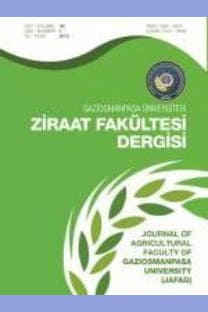Gender Differentials in Accessing Forest Products as Means of Livelihood in Ondo State, Nigeria
Gender Differentials in Accessing Forest Products as Means of Livelihood in Ondo State, Nigeria
___
- Adebayo AA (2009). Attaining Sustainable Rural Development in Nigeria through Effective Management of Forest Based Resources. International Journal of Creativity and Technical Development, 1(1): 1 - 3.
- Aruwajoye AS and Ajibefun IA (2013). Assessment of Livelihood Strategies among Households in Forest Reserve Communities in Ondo State, Nigeria. International Journal of Scientific & Engineering Research, 4(7): 1650-1655.
- Ashimolowo OR and Otufale GA (2012). Assessment of Domestic Violence Among Women in Ogun State, Nigeria. Greener Journal of Social Sciences, 2(3): 102 - 114.
- BRIDGE (2008). Gender and Climate Change: Mapping the Linkages. A Scoping Study on Knowledge and Gaps. Prepared for the UK Department for International Development. In: Alyson Brody, Justina Demetriades and Emily Esplen (eds), BRIDGE, Institute of Development Studies (IDS), UK.
- Canadian International Development Association (CIDA). (undated). Gender Equality and Climate Change: Why Consider Gender Equality When Taking Action on Climate Change? http://www.acdicida.gc.ca/INET/IMAGES.NSF/vLUImages/Climate% 20change3/$file/Gender-2.pdf.
- ISSN: 1300-2910
- Yayın Aralığı: Yılda 3 Sayı
- Başlangıç: 1985
- Yayıncı: Tokat Gaziosmanpaşa Üniversitesi Ziraat Fakültesi Dergisi Yayın Ofisi
Beyaz, Siyah ve Yeşil Çay Kullanılarak Üretilen Kombuchaların Bazı Özelliklerinin Belirlenmesi
MEHMET GÜLDANE, MUSTAFA BAYRAM, SEMRA TOPUZ, CEMAL KAYA, Hatice Burcu GÖK, Murat BÜLBÜL, Merve KOÇ
Stevia rebaudiana Bertoni Bitkisinin İn vitro Üretim Potansiyeli ve Tokat Şartlarına Adaptasyonu
Gender Differentials in Accessing Forest Products as Means of Livelihood in Ondo State, Nigeria
Adewale Isaac FATUASE, Lawrence Olusola OPARINDE, Taiwo Timothy AMOS
Ali Salek ZAMANI, Abolfazl NASSERİ
Chris CAVALARIS, Odisseas MERKOURIS, Christos KARAMOUTIS, SERAP AKDEMİR, Diomi MAMMA, Dimitrios KEKOS, Theofanis GEMTOS
Bitkisel Üretimde Çiftçilerin Girdi Kullanım Bilinç Düzeylerinin Analizi: Trakya Bölgesi Örneği
GÖKHAN UNAKITAN, Başak AYDIN, MECİT ÖMER AZABAĞAOĞLU, HARUN HURMA, CELAL DEMİRKOL, FUAT YILMAZ
Nusaybin (Mardin) İlçesi Bağcılığı Sorunları ve Çözüm Önerileri
Atilla Çakır, NESRİN KARACA SANYÜREK, ERSİN KARAKAYA, Şilan AY
